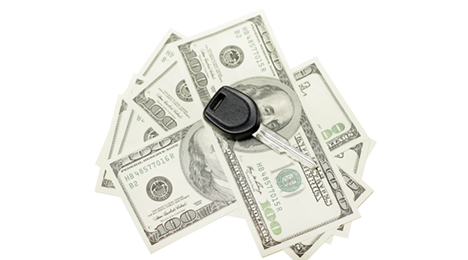June’s auto loan metrics bucked the trends seen in other credit markets to register a new historical low, according to the latest S&P/Experian Consumer Credit Default Indices.
Analysts from S&P Dow Jones Indices and Experian noticed the auto loan default rate in June dropped 1 basis point on a sequential basis and 11 basis points year-over-year to settle at 0.85 percent.
The new historic low point for auto loans is 190 basis points below the high point of the data S&P and Experian has that dates back 10 years. That high mark arrived in February 2009 when the Great Recession caused a default surge to 2.75 percent.
Meanwhile, analysts spotted the June composite rate — a comprehensive measure of changes in consumer credit defaults — rose 5 basis points in June from the previous month to land at 0.93 percent. But that latest composite rate still is 9 basis points lower than a year ago.
S&P and Experian determined the default rates for first mortgages and second mortgages increased, too
The first mortgage default rate came in at 0.80 percent, 6 basis points higher than its historical low in May. The second mortgage default rate reported an increase of 13 basis points to 0.55 percent.
The bank card default rate dropped another 10 basis points, reporting in at 2.88 percent in June.
“Among the different categories, bank cards saw the largest drop while auto loans were off by a tick,” said David Blitzer, managing director and chairman of the index committee.
“First and second mortgages saw a small increase in defaults,” Blitzer continued. “None of these data are immediate cause for concern. They reflect continued optimism and spending by consumers."
Analysts also mentioned three of the five major cities also continued their downward trend, reporting negative month-over-month default rates in June.
Los Angeles led the way, reporting at 0.88 percent, down 7 basis points from the previous month.
New York and Dallas continued their downward inclination, reporting historical lows of 0.91 percent and 0.68 percent, decreases of 4 basis points and 2 basis points, respectively.
Miami had a significant increase of 25 basis points, reporting 1.42 percent in June.
Chicago halted a three-month decline to report a default rate of 1.04 percent, up 4 basis points from the previous month.
“This report, and the economy's overall condition, both look a lot like last month,” Blitzer said. “The economy continues to expand at a modest pace, helped by the 5.3 percent unemployment rate, a continued low rate of initial unemployment claims and recent improvements in housing starts.
“All of these factors should continue to support the current low rate of consumer credit defaults,” Blitzer continued.
Despite that general upbeat assessment, Blitzer cautioned there are some factors that raise concern for both consumers' financial conditions and the economy.
“While oil prices are low, they remain volatile as traders and investors weigh the impact of Greece, the agreement with Iran, and the latest bounce and bump in China's equity market,” he said.
“For consumer spending, oil matters the most of these possible developments,” Blitzer continued. “Oil price swings are feeding into consumer prices as seen in the uptick in the June CPI numbers. However, we would need higher inflation for a long time period before it would worry consumers or cause a pause in spending or credit usage.”
Blitzer closed his latest analysis by touching on the trends associated with the five major metro areas.
“Looking across the five cities reported on each month, Miami shows a jump in consumer defaults, Chicago saw a slight uptick, while the others saw default rates flat to down,” he said. “The favorable default trends remain in place.
“The increase in Chicago's numbers is too small to be a concern. Miami's figure does not appear to be an issue, either; in the next month or two, data are likely to show Miami in good shape compared with the other cities,” Blitzer continued.
Jointly developed by S&P Indices and Experian, analysts reiterated the S&P/Experian Consumer Credit Default Indices are published monthly with the intent to accurately track the default experience of consumer balances in four key loan categories: auto, bankcard, first mortgage lien and second mortgage lien.
The indices are calculated based on data extracted from Experian’s consumer credit database. This database is populated with individual consumer loan and payment data submitted by lenders to Experian every month.
Experian’s base of data contributors includes leading banks and mortgage companies and covers approximately $11 trillion in outstanding loans sourced from 11,500 lenders.
Westlake Financial Services and Equifax now have more data to support their argument that subprime auto financing can benefit individuals with soft credit histories, rather than create a negative situation some regulators and consumer advocates might believe.
Equifax recognized Westlake Financial Services on Tuesday as the national finance company whose customers saw the highest credit score increase over the term of their loan. This development was a follow-up to a white paper Equifax released extolling the significant benefits that subprime customers can receive when they got a second chance by successfully paying their vehicle installment contract.
According to Equifax research data, when comparing a national sample of 125,000 customers with auto loans originated in the 2014 calendar year, Westlake Financial Services customers produced the highest average credit score increase over the term of their loan.
“We focus on a loan structure that works long term for the customer, which helps increase their credit rating as payments are made over time,” said Westlake Financial Services group president Ian Anderson, the recipient of last year’s SubPrime Auto Finance Executive of the Year Award who is expected to a panelist again during this year’s SubPrime Forum during Used Car Week.
“Westlake strives to make our customers’ lives better,” Anderson continued. “By helping our borrowers increase their credit scores, we make it easier for them to qualify for loans and purchases in the future.”
Two of the most recent Equifax white papers highlighted the positive elements of subprime auto financing.
Last summer, Equifax chief economist Amy Crews Cutts and deputy chief economist Dennis Carlson highlighted the position in a white paper titled, "Not Yesterday’s Subprime Auto Loan." They reiterated the importance subprime financing to the future of consumers who have damaged credit profiles. The Equifax economists noted the positive consumer ramifications well known to finance company executives at institutions that specialize in subprime contracts such as the importance of quality transportation to enhance employment opportunities and how steady payment performance can possibly lead to a rise toward prime status.
“If a borrower with subprime credit obtains a loan from a financial institution that reports the complete payment histories of their clients to the national credit reporting agencies, and that borrower makes timely payments on that loan and other credit obligations, then over time that borrower’s credit score will likely improve, possibly enough to qualify for prime credit terms,” Crews Cutts and Carlson said.
Then at the beginning of this year, Equifax again found data that clearly backed up the claim, which the company shared in a report titled, "Subprime Auto Loans: A Second Chance at Economic Opportunity."
Equifax determined that over a three-year time period, those consumers with deep subprime credit scores that originated a subprime auto loan showed, in aggregate, a significant increase in their credit score. In fact, analysts highlighted those consumers improved their credit score by a median of 52 points, which is a 62.5-percent improvement over the median score change of the group that did not take out a loan.
And now the industry has the performance of Westlake customers to refute naysayers’ claims about the possibility of finance companies taking advantage of subprime customers.
“Westlake’s interest in our original article prompted us to examine, at a lender level, where the improvements of subprime customers graduating to near-prime and prime standing was the greatest,” Equifax auto finance leader Lou Loquasto said.
“Westlake and other subprime lenders like them should be lauded for giving the right customers the right loan, and for enabling them to get back on their feet,” Loquasto went on to say.
Discussions and industry highlights are all on tap to be a part of this year’s SubPrime Forum, which is set for Nov. 16-18 at the Phoenician in Scottsdale, Ariz. Registrations are already open and sponsorships are also available. More details can be found at www.usedcarweek.biz.
FICO is offering finance companies strategy recommendations for those who fear that they’re reviewing too many applications for fraud, yet still finding fraudsters on the books. FICO also questioned whether finance companies have a clear definition of what is fraud and what is bad debt.
To answer those questions and more, FICO is hosting the hour-long webinar on Monday beginning at 1 p.m. ET.
“Application fraud is a growing and increasingly costly problem, FICO officials said. “Auto lenders are struggling to detect it while remaining responsive to their good customers and agile in making originations decisions.
“Meanwhile, organized criminals are becoming more sophisticated in their attacks,” they continued.
FICO highlighted this educational webinar is geared to give managers analytic strategies to authenticate genuine customers and detect fraudulent applications.
Among the specific topics on the agenda are:
• The current face of application fraud: What does it look like in 2015, and what unique challenges does it present to the auto industry?
• What are matching technologies, and how can you use them to detect application fraud?
• How can auto lenders use analytics to increase detection and lower the burden of maintaining rules?
• What kind of data — both internal and external — should you use to assess risk and combat application fraud?
• How can you leverage social network analysis to bust fraud rings?
• What are some case study examples of organizations that are winning the fight against application fraud?
Finance companies can register for the free FICO webinar here.
Leveraging the possibilities of alternative credit data to enhance the underwriting process percolated several times during industry events earlier this year. On Tuesday, FactorTrust responded to the inherent need for increased credit opportunities for non-prime consumers by rolling out a new tool the consumer data provider is calling LendProtect Auto Score.
FactorTrust explained the LendProtect Auto Score is a credit risk solution for auto finance companies serving non-prime consumers that is delivered independently of the three largest credit bureaus and is based on FactorTrust’s alternative credit data. The core data that is used to define a consumer’s score includes:
— Unique alternative tradeline data
— Application information
— Stability metrics
— Payment data
FactorTrust chief executive officer Greg Rable insisted those four data points are not available through the major credit bureaus. Rable indicated expansions of the score this new tool can produce are available. That expansion can include other data points such as public records.
“The best indicator of future performance is past performance. In the past, lenders serving non-prime consumers have not had a full picture of a consumer’s credit history,” Rable said. “That changes with the LendProtect Auto Score, which opens up more auto credit access to millions of people who need access to transportation.”
FactorTrust reiterated the depth of the potential market where LendProtect Auto Score could be useful. The company pointed out there are more than 50 million non-prime consumers in the U.S. who do not choose to use traditional credit opportunities due to convenience, lack of credit history or lack of a relationship with a credit provider.
FactorTrust also referenced a study by the Credit Union National Association, which estimated that this same population of people can increase their income by as much as 25 percent if they have access to reliable transportation.
And to help finance companies cater to this demographic and potentiall enhance quality of life, Rable said, “This score is purpose-built for the non-prime auto area.
“The consumer characteristics captured in the LendProtect Auto Score are tuned to the unique consumer profiles in this specific market,” he continued. “Now non-prime consumers that have low FICO scores can benefit through increased access to credit and better rates, when positive alternative credit history is found in our database.”
FactorTrust went on to mention that finance companies that leverage the LendProtect Auto Score now can offer consumers more flexibly priced loans, while at the same time mitigate losses through the incorporation of alternative credit data.
Using proprietary alternative data, the LendProtect Auto Score can capture the highest-risk consumers in lower score bands and promotes the lowest-risk consumers into higher score bands. This process can allow finance companies that are working with consumers that would have identical profiles within the three large credit bureaus to be decisioned more accurately.
“We are proud to offer the auto industry a solution to help them better serve non-prime consumers. Through this product we are further establishing FactorTrust as the leading provider of alternative credit data for the auto lending industry,” Rable said.
FactorTrust added the LendProtect Auto Score is compliant Fair Credit Reporting Act and the Equal Credit Opportunity Act.
Finance companies that are interested in learning more can visit www.factortrust.com.
Another executive who spent time in a leadership position at J.P. Morgan Chase now is holding an even higher post at Santander Consumer USA Holdings.
Not long after the finance company elevated Jason Kulus to be SCUSA’s chief executive officer, Santander appointed Blythe Masters as non-executive chairman of the board of directors.
Masters, who now is CEO of Digital Asset Holdings, succeeds Stephen Ferriss, who served as interim chairman since July 3 and remains on the Board.
Prior to leading Digital Asset Holdings, Masters held senior executive roles at J.P. Morgan Chase. She served as the head of its global commodities business from 2007 to 2014, as the head of corporate and investment bank regulatory affairs from 2012 to 2014, and as chief financial officer of J.P. Morgan's investment bank from 2004 to 2007.
Timothy Ryan, chairman of the board of directors of Santander Holdings USA, SCUSA's parent company, said, “Ms. Masters’ global financial experience and leadership in U.S. banking aligns well with our broad development strategy and objectives for Santander's business in the U.S.”
SCUSA also highlighted Masters also has broad experience leading industry associations and non-profit boards. Masters is the former chair of both the Global Financial Markets Association (GFMA) and the Securities Industry and Financial Markets Association, and she currently serves on the boards of the Breast Cancer Research Foundation and the Global Fund for Women.
“I am honored to join the SCUSA Board and am pleased to serve as chairman,” Masters said. “SCUSA has an impressive history of growth and entrepreneurship that will serve it well as it builds foundations for the future.
“I look forward to partnering with my new colleagues and shareholders, and working alongside SCUSA CEO Jason Kulas and his team, as we continue to focus on increasing shareholder value,” she went on to say.
Like Masters, Kulas spent significant time within J.P. Morgan Chase’s organization before becoming associated with SCUSA. Kulas joined SCUSA after serving as managing director in investment banking for JPMorgan Securities where he was employed from 1995 to 2007.
“Blythe Masters' deep understanding of the financial markets and emerging bank technologies, coupled with her regulatory expertise, make her the right choice to lead the SCUSA board,” said Kulas, who became CEO earlier this month.
“She has a long track record as an innovator, which fits SCUSA's entrepreneurial culture and our focus on using data and scalable technology to originate and service attractive consumer assets,” he added.
Joining Masters on the SCUSA board are these new directors, including:
— Jose Garcia Cantera
— Victor Hill
— Monica Lopez-Monis Gallego
— Javier Maldonado
— Robert McCarthy
— William Rainer
The additions bring the total number of SCUSA board members from 12 to 13, six of whom are independent directors. The independent directors include Ferriss, Masters and McCarthy, along with William Rainer, Wolfgang Schoellkopf and Heidi Ueberroth.
“I wish to thank Gonzalo de Las Heras, Roman Blanco, Alberto Sanchez, Javier San Felix, Tagar Olson, Matthew Kabaker, John Corston and William Hendry for their dedication and service to SCUSA,” Ferriss said.
“Their contributions were invaluable for the business as it transitioned from a privately held entity through its first year as a publicly traded company,” Ferriss went on to say.
On Monday, F&I program provider RoadVantage added three industry veterans who have decades of dealership experience to its sales team, as well as a trio of new regional offices.
Joining the company leadership team is Dave Bouchat, who comes to RoadVantage from DCH Auto Group. A 30-year industry veteran who was with AutoNation prior to DCH, Bouchat now is with RoadVantage as vice president of business development.
Phil Mullen, an NADA Dealer Academy graduate with 30 years of retail experience, joined RoadVantage as national sales manager. Mullen has worked with dealerships as well as agencies, including Fidelity Dealer Services and JM&A.
Furthermore, Sue Ann Caruso, also with 30 years of dealership and agency experience including several years with Country Auto Group, now is a regional vice president with RoadVantage.
“RoadVantage is distinguished by its vision, its passion and its momentum,” Bouchat said. “These qualities are inimitable, and they’re what make RoadVantage the fastest-growing F&I provider in the market today.
“I’m pleased to be part of this team,” Bouchat added.
These additions come upon the completion of the company’s fourth consecutive year of rapid growth. RoadVantage added three regional offices on the East Coast, including Boston, Miami and Long Island, N.Y.
Amid this growth, RoadVantage insisted that the company still maintains its service levels with 97 percent of claims approved within eight minutes.
“With its innovative programs and commitment to service levels, RoadVantage is setting a new industry standard,” Mullen said. “I’m excited to join this team of seasoned industry leaders and to be part of the future in F&I.”
Earlier this year RoadVantage introduced True Coverage, an approach to F&I that’s aimed at reducing exclusions and simplifying contracts. More details can be found at www.roadvantage.com/true-coverage.
Also, RoadVantage recently rolled out what it pitched as a turnkey compliance management system to help dealers with compliance mandates from the Consumer Financial Protection Bureau. The company also boasts what it calls the Total Solution, a bundled product that can help drive profits for both retail sales and lease programs.
With those products in place, an enhanced leadership team and a larger office footprint, RoadVantage chief executive officer Garret Lacour described what all of the additions mean not only to the company but dealers, too.
“Dave, Phil and Sue Ann are valuable assets to the RoadVantage team as we continue our commitment to providing the best products and service in the industry,” Lacour said. “They bring almost 100 years of combined industry experience, insights and connections to our team, and we are thrilled to welcome them aboard.”
Spireon chief marketing officer Shawn Hansen gave dealers and subprime finance companies what he called the “bottom line” about the potential benefits of the company acquiring Inilex.
For operations that demand a GPS device be attached to a vehicle in order for the financing and installment contract to be finalized, Hansen highlighted that Spireon clients now can pivot the conversion to show that it’s not just about underwriting criteria. The device can open the door to a wide array of consumer applications, and more importantly for dealers and finance companies, the chance to generate more revenue.
“There is a whole range of consumer applications that can be layered once the GPS tracker is in place,” Hansen said during a conference call after Spireon announced the acquisition of Inilex earlier this week.
Hansen continued that during the past 20 years, “the IT industry in general has been totally turned on its head because of what’s happened with consumer applications.
“Because of consumer demand, companies have changed their IT policies in the way they give productivity apps to their users. We see that same thing happening with car dealerships in buy-here, pay-here and subprime,” he continued. “We see that users will benefit from additional applications they can use on their phones or get direct access to. This is a very complementary fit that give the dealer an opportunity to show where the value is to their customers.”
Through this acquisition, Spireon now has 2.3 million connected vehicles in its network.
“An auto finance company or dealership who already uses GPS technology and can offer the customer the chance to track their vehicle can now make more money. That’s the bottom line,” Hansen said.
“They can make more money by offering theft recovery services and additional consumer applications to the end user,” he continued. “It presents a way to increase their profits and to add another value proposition on top of the fact that their vehicle is being tracked and they’re getting a loan that they might not be able to get otherwise.”
While they might have been seen as industry competitors, Hansen indicated Spireon and Inilex have had “a long-standing relationship.” That situation led in part to the deal.
“Inilex has been a customer of Spireon in providing some of the underlying technology for them. It was a natural fit for the two companies to come together,” Hansen said.
“We’ve been discussing this for some time. I’m not in a position to say how long it was going on, but the business relationship has been in place for some time,” he continued.
Hansen noted Spireon did not face any antitrust or regulatory hurdles to complete the acquisition.
“This is a relatively straightforward integration of the two companies,” he said.
Hansen also mentioned a message to any dealers or finance companies that were solely Inilex customers prior to this week’s developments.
“Integration is happening right now. Sales and marketing channels are already integrating,” Hansen said. “As far as the technology is concerned, we’re kicking off those efforts. We’re going to out to all of our different dealer channels to let them know this work is being done and will be completely relatively shortly.”
While much of the industry is somewhat gnashing its collective teeth over the consent agreement American Honda Finance Corp. reached with federal regulators, Arent Fox senior automotive counsel Rob Cohen used descriptors such as “silver lining” and “golden goose” when analyzing the ramifications of the captive’s move with the Consumer Financial Protection Bureau and Department of Justice.
Cohen explained in a message to SubPrime Auto Finance News that American Honda Finance could have leveraged findings from the Charles River Associates study orchestrated by the American Financial Services Association. Cohen pointed out that analysis showed dealer participation disparities among minority borrowers are based upon “deeply flawed” data.
So where does the “silver lining” and “golden goose” come into play? With this consent order, Cohen said the CFPB demonstrates a lack of understanding of the indirect financing model.
“By limiting the amount of dealer participation, the CFPB has neither eliminated discretionary pricing nor has it taken any action that will result in lower finance rates to consumers,” he said. “Under this consent order, AHFC is free to charge higher wholesale finance rates to dealers and still remain competitive with other auto finance companies that have no restrictions on their compensation models.
“What remains to be seen is whether AHFC will provide additional ‘non-discretionary’ compensation to make up for the reduced retail margin,” Cohen added.
According to regulators, Honda will reduce dealer discretion to mark-up the interest rate to only 1.25 percent above the buy rate for contracts with terms of 5 years or less, and 1 percent for auto loans with longer terms. Honda also has the option under the order to move to non-discretionary dealer compensation.
“The bureau did not assess penalties against Honda because of Honda’s responsible conduct, namely the proactive steps the company is taking that directly address the fair lending risk of discretionary pricing and compensation systems by substantially reducing or eliminating that discretion altogether,” said CFPB officials, which also ordered the captive to pay $24 million in restitution to affected borrowers.
Kelley Blue Book senior analyst Karl Brauer suspects the consent order will sharpen regulators’ focus even more.
“A decision like this will lead to closer scrutiny of the dealerships’ financing practices by Honda, though it’s difficult for Honda to monitor every finance deal at every one of its dealers,” Brauer said in a message to SubPrime Auto Finance News. “It’s unfortunate Honda has to pay the fine when the dealers are the primary entity in how these loans are structured.
“Honda’s choice was to pay the fine or fight the charges, and given the negative publicity a case like this will generate, they probably see the fine as the most efficient solution,” he continued.
Publicity is an area also mentioned by Edmunds.com president Seth Berkowitz, whose site works with about 500 Honda dealerships. Berkowitz explained long-term ramifications depend on which “narrative is on the ascendancy,” meaning will it be the one from the CFPB and DOJ or industry associations.
“There’s nobody in the United States that would be excited about unfair lending practices or could defend that in any way,” Berkowitz said during a phone interview this week. That’s on the one hand.
“But the other question is, is the type of CFPB imposed settlement going to have much broader impacts than the narrow effort to deal with unfair lending practices,” he continued. “The industry claim is that these caps are going to impact people’s ability to garner discounted financing. To the extent that narrative prevails, then I think people will look at this as perhaps the government ultimately impacting their ability to secure cheaper or better financing.
“It will be interesting over the coming weeks which narrative prevails because I think everyone is interested in cheap and fair financing,” Berkowitz went on to say.
No matter, Honda dealerships are going to be impact since their captive permitted stores to mark-up consumers’ interest rates as much as 2.25 percent for contracts with terms of five years or less, and 2 percent for contracts with longer terms.
“Dealers have increasingly leveraged F&I as a source of profit over the last few decades because of reduced margins on new-car pricing,” Brauer said.
“F&I is more important now than ever before in contributing to a dealership's bottom line, and given the growing length and size of car loans in today’s market, there’s an unprecedented amount of money flowing through these departments,” he went on to say.
And from Berkowitz’s view, don’t expect a parade of captives implementing changes unless regulators force the modifications.
“Stemming from the industry reactions, it would seem unlikely that the captive finance arms would voluntarily impose upon themselves what was worked through in the settlement with Honda,” Berkowitz said.
Brauer closed the discussion with one more thought.
“All finance companies have to follow equal lending laws or risk being investigated and fined,” he said. “Unfortunately, while most companies follow best practices for equal lending, there’s always a percentage trying to generate extra profit through unscrupulous policies.”
NextGear Capital recently announced plans to expand into 30 additional markets across the U.S. The company indicated that its enhanced technology offerings, flexible terms and customer service have led to an increase in customers, resulting in the need for these additional markets.
As a result of this expansion, which the company projects to be completed by the end of the third quarter, NextGear Capital will add 50 new employees that will include account executives and regional directors to support the company's customer base of more than 20,000 dealers.
NextGear Capital emphasized these knowledgeable, local representatives will be responsible for maintaining and developing relationships with dealers at their place of business — whether it’s on their lot or in the lanes.
"More and more dealers continue to choose NextGear Capital as their preferred floor plan provider for our unparalleled technology and our reputation of being a respected, consultative partner to dealers big and small,” NextGear Capital president Brian Geitner said.
“By expanding our market reach and adding more talented automotive professionals to our team, we can continue to help dealers do what they do best: sell cars,” Geitner continued.
NextGear Capital already boosted its workforce by adding 100 new employees through the first six months of the year to its in-house technology team while also integrating Kelley Blue Book Values to its myNextGear Web and mobile platforms.
Recently, the company received the IT Services for Business Mira Award from TechPoint, Indiana's technology growth initiative. NextGear Capital was honored for its development and implementation of a proprietary ERP/CRM mobile platform.
AUL Corp. has worked with dealers and agents to sell extended service warranties to their vehicle buyers for the past 25 years.
On Tuesday, AUL chief executive officer Luis Nieves rolled out a pair of products that are being targeted directly at consumers in most every state. The two products are Trustmark Warranty and Seller’s Edge.
Nieves indicated Seller's Edge is what he called an “entirely new concept and product.” A private vehicle seller can now purchase a short-term, powertrain warranty for their used unit and pass that inspection and warranty onto the buyer.
With the written inspection and warranty, Nieves highlighted a private individual can now offer a similar product to the certified pre-owned vehicles that are marketed by dealerships.
“This product virtually eliminates the uncertainty for the 11 million people who buy cars from other individuals in the U.S. each year,” Nieves said.
“And, for the seller, that person has a decided advantage over all the other cars of similar make and model in the market, ensuring that their car sells faster and for more money with this added benefit,” he continued.
Nieves went on to explain the elements of Trustmark Warranty. For individuals who already own a vehicle that has an expired factory warranty, or a unit that’s near the end of its warranty, Nieves explained Trustmark Warranty offers long-term vehicle service warranties directly to consumers
For more details about these products go to SellersEdge.com or TrustmarkWarranty.com.












